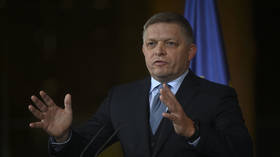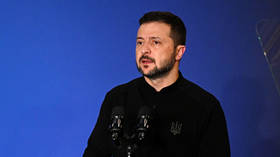‘High probability’ of Ukraine conflict ending soon – EU state’s PM

Slovak Prime Minister Robert Fico said on Wednesday that he believes there is a high possibility the Ukraine conflict could end soon, news agency TASR has reported.
Fico made the remarks at a session of the parliamentary European affairs committee before leaving for Brussels for a European Council meeting where Ukrainian leader Vladimir Zelensky has been invited to present his so-called victory plan.
“The probability of ending the war in Ukraine in a short time is very high,” the Slovak leader was quoted as saying, adding that he expects the European Council meeting to indicate when that could be the case.
He highlighted that “the issue of inviting Ukraine to NATO is suddenly being brought up,” and said that such an invitation would not be “free of charge.”
Fico reiterated that Slovakia opposes Ukraine’s invitation to NATO because he believes it would result in World War III.
The Slovak prime minister already said earlier this month that Bratislava would veto Ukraine’s potential accession to the US-led bloc and will “never agree” to it due to the threat of a world war posed by such a move.
NATO pledged to bring Ukraine into the fold in 2008, ignoring Russia’s warnings that it would view that as a major threat to its national security. Russian President Vladimir Putin has said that one of the main reasons for the conflict, which began in February 2022, was Ukraine’s desire to join NATO and its “genocide” of the people in Donbass, which is now part of Russia.
Russia has never ruled out talks on Ukraine, and Putin said in June that Moscow would immediately agree to a ceasefire and start negotiations if Kiev were to withdraw troops from the Donetsk, Lugansk, Kherson, and Zaporozhye Regions and commit to neutrality. But in August, he said that any discussion was out of the question as long as Ukrainian troops continue to occupy part of Russia’s Kursk Region.
Ukraine has repeatedly rejected anything short of returning to its 1991 borders, which Russia considers delusional.
On Wednesday, Zelensky presented his ‘victory plan’ to the Ukrainian parliament, suggesting it could help bring the conflict with Russia to a close as early as next year. The plan, among other things, includes a demand that Kiev receive an invitation to immediately join NATO. Zelensky also called for strengthening Ukraine’s defense capabilities, including by lifting Western restrictions on the use of foreign-made long-range weapons for strikes against Russia, and urged continued incursions into the neighboring country’s territory.
Kremlin spokesperson Dmitry Peskov has advised Kiev to “sober up” and acknowledge the roots of the conflict, saying that “most likely, it’s the same American plan to keep fighting a war with us to the last Ukrainian, which Zelensky has camouflaged and now calls a peace plan.”













